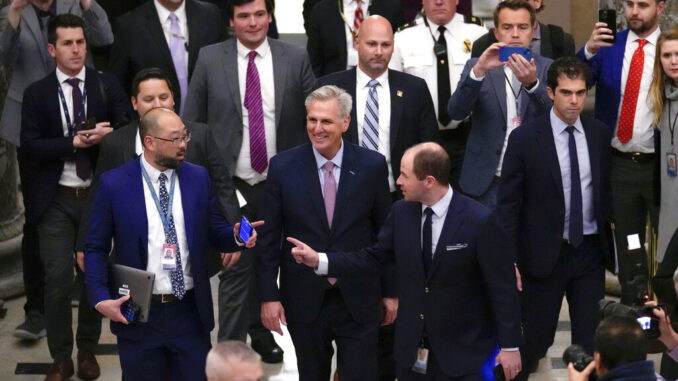
It sure looked confusing for Republicans at the start of this Congress.
One would have presumed all the negotiation and dickering could have been hammered out behind closed doors during the down months of November and December. No Speaker election had taken as long as this one since before the Civil War.
However, once the details of the concessions demanded by the Freedom Caucus were made public, all I could think of was why did it take so long for Republicans to finally come to their senses and start acting like fiscal conservatives once again.
It was like watching the Washington version of “Back to the Future.”
The “concessions” made by Speaker Kevin McCarthy were once considered common sense by a vast majority of elected House Republicans. It brings into question why McCarthy didn’t agree to them without a fight in November before this fracas went public.
Two of the bedrock principles of Republicanism since its founding in 1854 have been diffusion of power away from any concentrated source and fiscal and financial prudence and balance. Thomas Jefferson, James Madison and Henry Clay spoke eloquently and often about the critical importance of legislative bodies holding the key to all power in government ― allowing any single person or small group of elected leaders to hold all the power leads to tyranny and self-interested decision making, not democratic republican freedom.
The Freedom Caucus rebels seem to have restored legislative supremacy power back in the Republican majority caucus at least. The Democrat caucus didn’t seem to mind letting former Speaker Nancy Pelosi run roughshod over House rules and precedent and make all decisions in the Speaker’s office but that is their problem to figure out.
The reforms achieved by the Freedom Caucus are very similar to what fiscal hawks of both parties operated under in Congress in the 1990s. Republicans were in a seemingly permanent 85-seat minority until 1994 but there were 91 Southern Democrats and a few northern rural Democrats who joined together to put the brakes on federal spending.
In 1990, this group of adults met at Andrews Air Force base with OMB Director Richard Darman and other representatives of the President George H.W. Bush 43 White House to hammer out a budget agreement which would flatten the growth of spending over the next decade. Spending was held to about 2% annual growth due to a budget mechanism called PAYGO and discretionary spending caps under which Congress abided for the next 10 years.
The 1990 Budget Act was the mother to the 1993 House GOP “Cutting Spending First” proposal which provided the underpinnings to the 1997 Balanced Budget Act. The only four balanced budgets in the last 62 years occurred thereafter from 1998 to 2001. None of them would have happened had the 1990 agreement not contained many of the same principles brought back to life by the Freedom Caucus.
Congress will not consider any new entitlement program without corresponding cuts to the rest of the budget to pay for it and keep it budget-neutral, just like the PAYGO mechanism of the 90s. The Freedom Caucus and Republicans say they will present a budget that will balance in the next 10 years, most likely through holding overall spending to 2% annually ― which is the same thing that came out of the 1990 Budget Agreement.
They reinstated the prime importance of letting congressional committees do their work under normal procedure instead of letting the Speaker and staff make all the decisions on such things as the gargantuanly wasteful $1.7 trillion omnibus spending bills passed in late December. They also reinstated the common-sense rule to give everyone 72-hour notice instead of forcing them to vote on a bill before reading it, or as Nancy Pelosi would say, “We have to pass the bill first to see what is in it”.
What a ridiculous statement by any elected leader in a democratic republic.
The principles laid out by the Freedom Caucus are laudable. The next task is to find a way to work with at least 12 Democrats in the Senate, and maybe more, to put together a reconciliation bill that President Biden will sign into law ― which is a lot harder than reforming House rules.
The 1997 Budget Act had billions of dollars in entitlement spending reductions from the baseline and reforms. Everyone who voted for it lived to see another day. It takes courage, brains and cunning to get something that monumental done.
The next step for the Freedom Caucus is to get such an equally monumental bill done for the American people. If not, then this will be like a “good loss” or a “moral victory” ― it will not mean anything substantive in the long-run.


